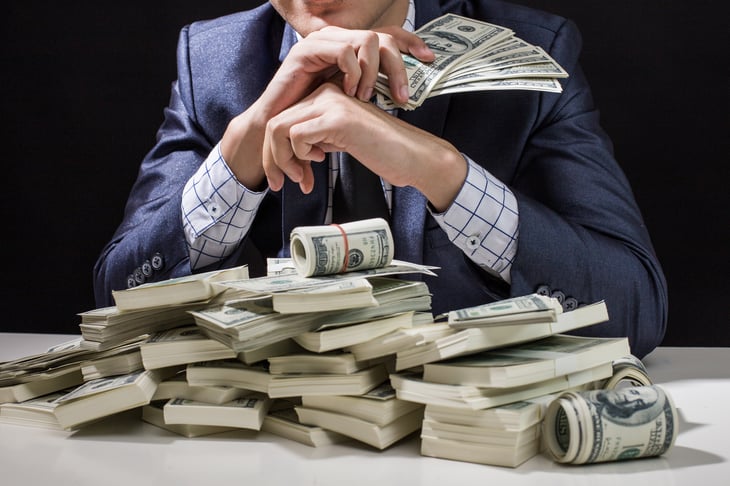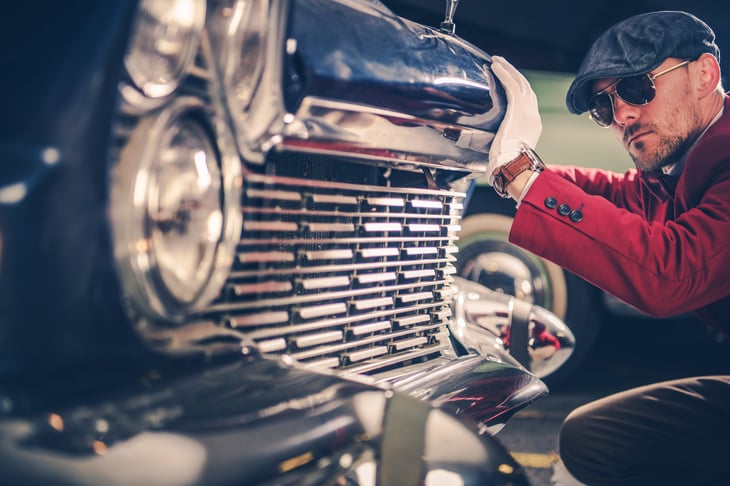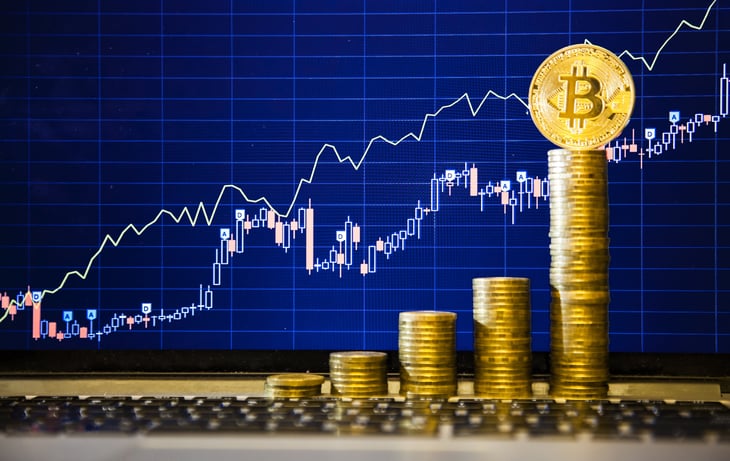What Do Banks Do With Millionaires Keep Their Money

Editor's Note: This story originally appeared on SmartAsset.com.
Where practise millionaires go along their coin? Loftier net worth individuals put money into different classifications of financial and real assets, including stocks, mutual funds, retirement accounts and real manor.
Most of the 20.27 one thousand thousand millionaires in the U.S. did not inherit their wealth from family; merely about 20% inherited their coin. More than 2-thirds of all millionaires are entrepreneurs.
Here are some of the places where the genuinely rich keep their money.
Cash and Cash Equivalents

Many, and mayhap almost, millionaires are frugal. If they spent their coin, they would not have any to increase their wealth. They spend on necessities and some luxuries, but they relieve and expect their entire families to practice the same.
Many millionaires keep a lot of their money in cash or highly liquid cash equivalents. They establish an emergency account before ever starting to invest. Millionaires bank differently than the residuum of u.s.a.. Any bank accounts they accept are handled by a individual banker who probably also manages their wealth. There is no standing in line at the teller'south window.
Studies indicate that millionaires may have, on average, as much as 25% of their money in greenbacks. This is to offset any market place downturns and to take greenbacks available as insurance for their portfolio. Cash equivalents, which are financial instruments that are almost as liquid as cash, are pop investments for millionaires. Examples of cash equivalents are money marketplace common funds, certificates of deposit, commercial paper and Treasury bills.
Some millionaires keep their greenbacks in Treasury bills that they keep rolling over and reinvesting. They liquidate them when they need the cash. Treasury bills are short-term notes issued by the U.South. government to heighten coin. Treasury bills are usually purchased at a disbelieve. When you sell them, the divergence between the confront value and selling price is your profit. Warren Buffett, CEO of Berkshire Hathaway, has a portfolio total of money market accounts and Treasury bills.
Millionaires too have zero-rest accounts with private banks. They leave their money in greenbacks and cash equivalents, and they write checks on their zip-residue account. At the end of the business organisation twenty-four hours, the private bank, as custodian of their diverse accounts, sells off plenty liquid assets to settle up for that 24-hour interval. Millionaires don't worry about FDIC insurance. Their money is held in their proper name and not the name of the custodial private banking concern.
Other millionaires have safe eolith boxes total of cash denominated in many unlike currencies. These rubber deposit boxes are located all over the world and each currency is held in a country where transactions are conducted using that currency.
Real Estate

For more than 200 years, investing in real estate has been the most pop investment for millionaires to keep their money. During all these years, real manor investments have been the primary way millionaires accept had of making and keeping their wealth.
The tendency started with buying a main dwelling and and then other residences, commonly for tenants. After ownership some personal real estate, then they start buying commercial real estate like office buildings, hotels, stadiums, bridges and more.
Millionaires often have large real estate portfolios. In one case they have established themselves as a buyer in the real manor market, existent manor agents start bringing them deals, and they find information technology piece of cake to obtain financing. Large investors have many millions of dollars tied up in existent estate.
Real manor is not an investment to depend on for greenbacks, just it is a lucrative investment in the long run and a tried and true investment for millionaires because they like passive income and find that real manor provides it.
Stocks and Stock Funds

Some millionaires are all virtually simplicity. They invest in index funds and dividend-paying stocks. They like the passive income from equity securities just similar they similar the passive rental income that real estate provides. They simply don't desire to apply their time managing investments.
Ultra-rich investors may agree a controlling interest in 1 or more major companies. But, many millionaires hold a portfolio of only a few equity securities.
Many may agree index funds since they earn decent returns and you don't have to spend fourth dimension managing them. They also have low management fees and excellent diversification. Millionaires also like dividend-paying stocks for the passive income they provide. Of form, they are too interested in upper-case letter appreciation just, for some, that's less of a concern than generating current income.
Individual Equity and Hedge Funds

Unless you are a multimillionaire, you lot may not participate in a hedge fund or buy into a individual disinterestedness fund. Public equity is well-known since its shares trade on stock exchanges. One of its advantages is its liquidity. You can readily liquidate your public equity or shares of stock.
Private equity funds, on the other hand, generally go their investments from large organizations like universities or pension funds. Investors of private equity funds have to be accredited investors with a sure net worth, normally at least $250,000.
Accredited investors tin can be individuals too every bit organizations, but they are divers by regulations. In other areas, individual equity funds practice not have to adjust to as many regulations equally public equity does. Some of the ultra-rich, if they are accredited investors, practise invest in private equity.
Hedge funds are not the same as individual equity. Hedge funds use pooled funds and pursue several strategies to earn outsized returns for their investors. Hedge funds invest in whatever fund managers think will earn the highest curt-term profits possible.
Commodities

Commodities, such as gold, silver, mineral rights or cattle, to name a few, are also stores of value for millionaires. Only they crave storage and have a level of complication that many millionaires simply don't want to deal with.
Alternative Investments

Some millionaires, along with the ultra-rich, go on a portion of their money in other alternative investments including such tangible assets equally fine art, expensive musical instruments or rare books.
Likewise, there are millionaires and the ultra-rich that accept investments in intellectual belongings rights such every bit the rights to songs or movies. These can exist very lucrative investments.
Cryptocurrency

It is estimated that there are around 100,000 cryptocurrency millionaires out there with the majority belongings Bitcoin. To try to make your fortune in cryptocurrency, you have to be willing to take on some hazard, and many millionaires don't have an ambition for risk.
Y'all can take a pocket-sized portion of a millionaire's wealth and invest in one of the different cryptocurrencies. Plenty of people have get millionaires this fashion. Some have lost their money. More than and more than, cryptocurrency is becoming accepted as a legitimate investment that deserves a wait when trying to accumulate wealth.
The Bottom Line

Millionaires have many different investment philosophies, so it'south hard to generalize concerning where they keep their money. However, all of the above are legitimate investments for millionaires.
They have a want for a reduction of their risk, so many adopt diversified investment portfolios. More than one of these investments can be combined to try to raise wealth.
Disclosure: The data you read here is e'er objective. Nevertheless, we sometimes receive compensation when you click links within our stories.
Source: https://www.moneytalksnews.com/slideshows/where-do-millionaires-keep-their-money/
Posted by: baldwinfrant1961.blogspot.com

0 Response to "What Do Banks Do With Millionaires Keep Their Money"
Post a Comment